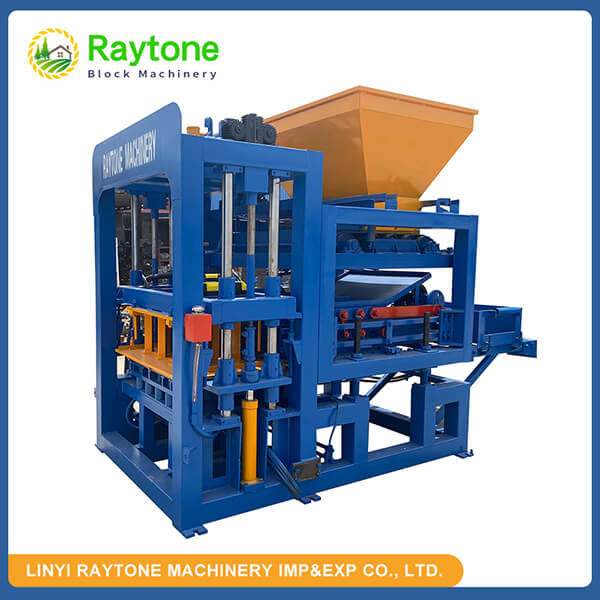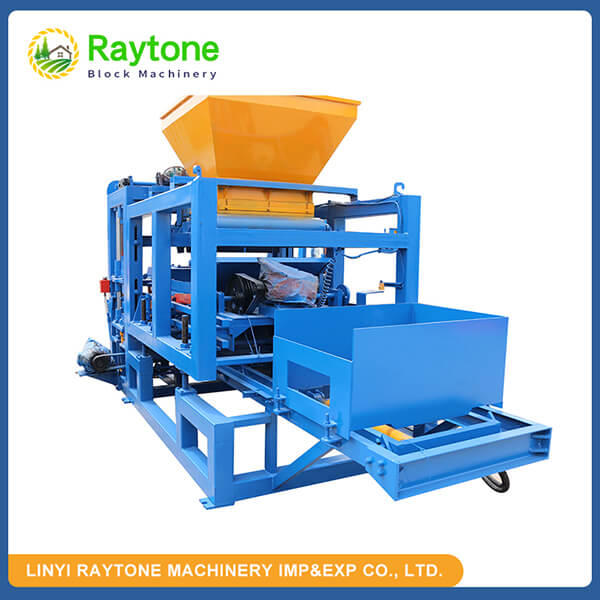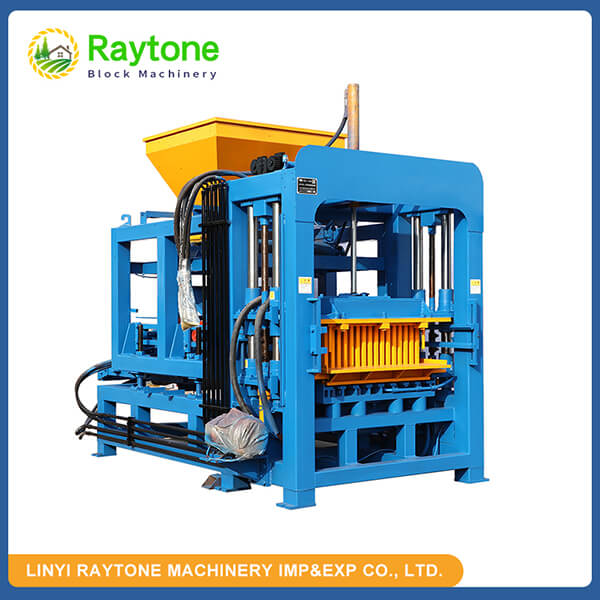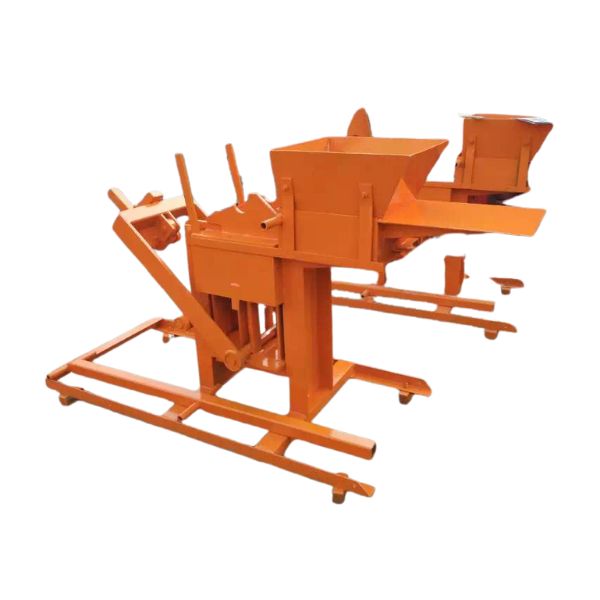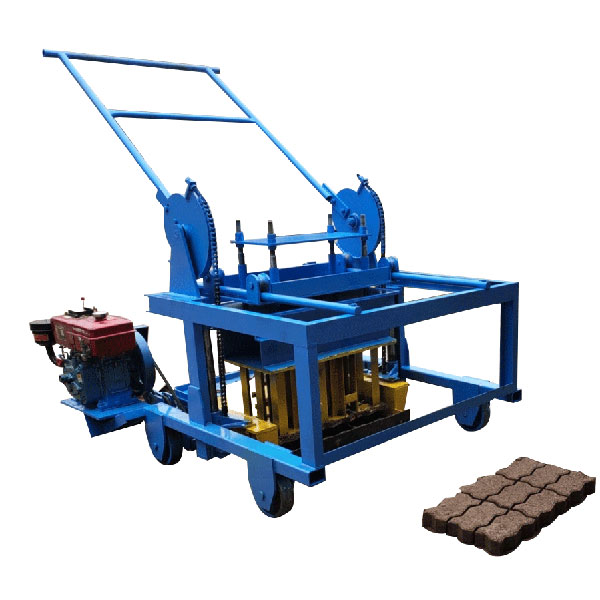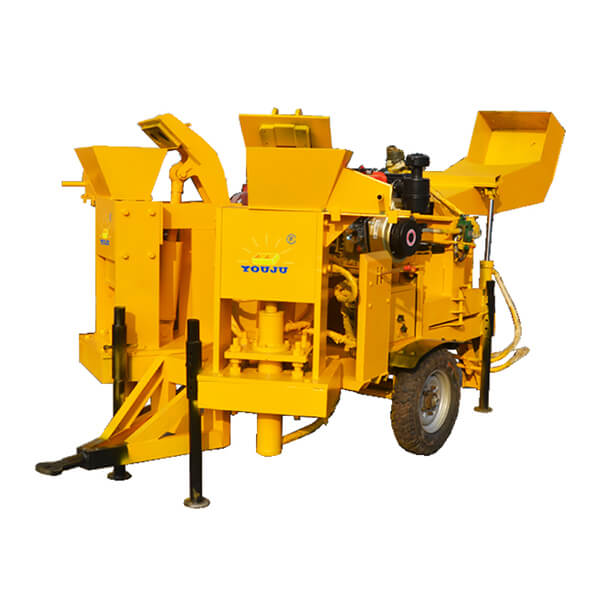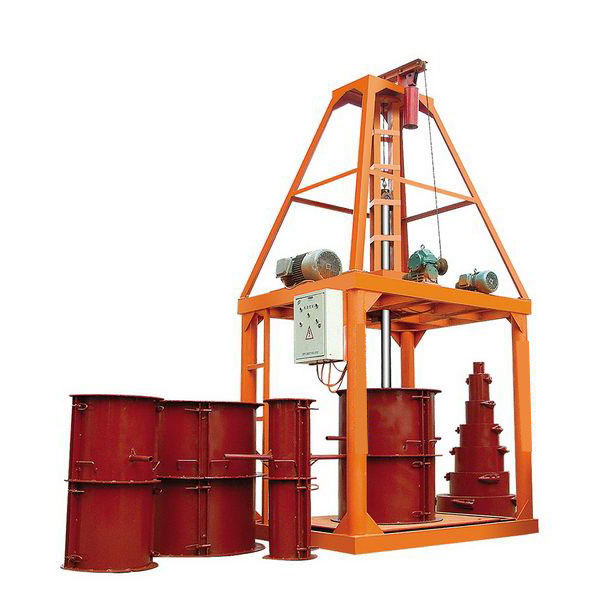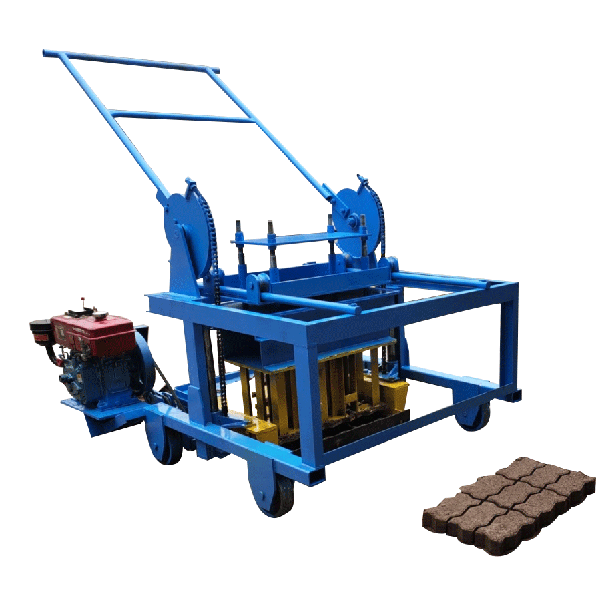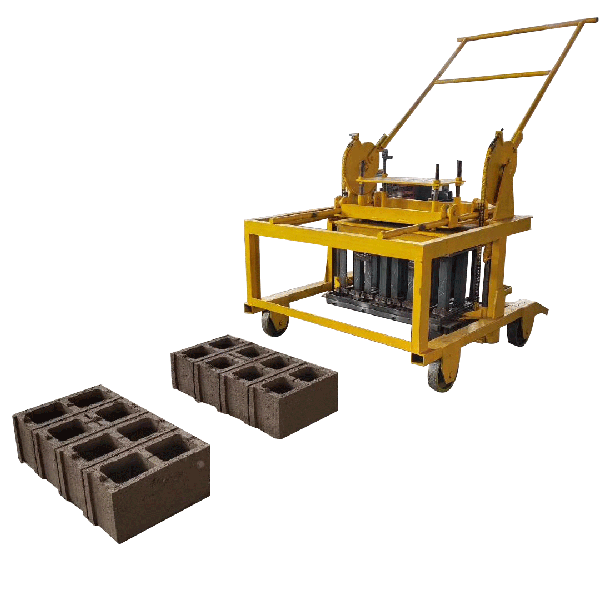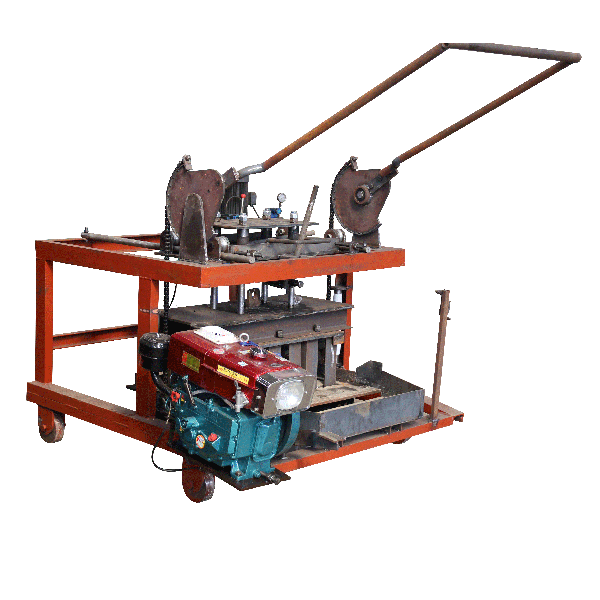The QTM4-45 mobile block machine operates on electric power. This small mobile block machine utilizes an electric motor to drive its dual vibration technology, ensuring strong block density and reliable performance. Unlike some larger industrial block-making equipment that may use diesel engines, the QTM4-45 is designed for efficiency and cost-effectiveness in small-scale operations. Its electric-powered system contributes to lower operational costs, reduced emissions, and quieter operation, making it an ideal choice for small construction projects and family businesses. The use of electric power aligns with the machine’s purpose of providing an affordable and practical solution for entrepreneurs looking to start or expand their block-making ventures.
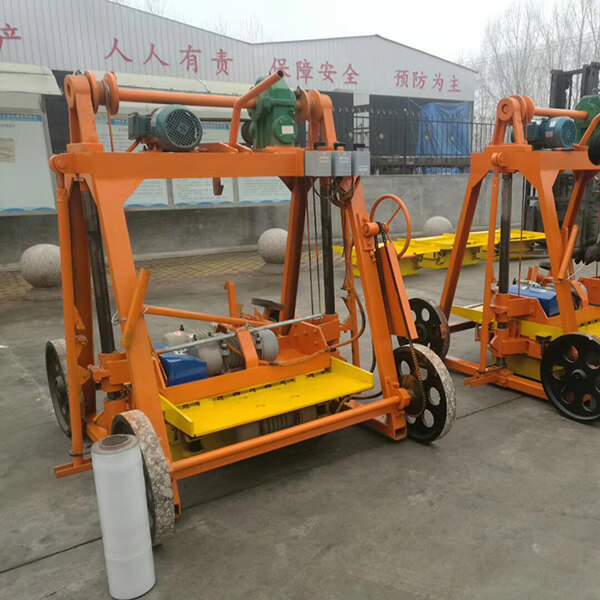
Understanding the QTM4-45 Mobile Block Machine’s Power System
Electric Motor: The Heart of the QTM4-45
The QTM4-45 mobile block machine is powered by a robust electric motor, which serves as the primary source of energy for all its operations. This electric motor is carefully designed to provide the necessary power and torque required for the block-making process. It drives the machine’s vibration system, which is crucial for compacting the concrete mixture and forming high-quality blocks.
The use of an electric motor offers several advantages over diesel-powered alternatives. Firstly, it provides a consistent and smooth power output, which is essential for maintaining the quality and uniformity of the produced blocks. Secondly, electric motors are generally more energy-efficient than diesel engines, leading to lower operating costs over time. Lastly, they require less maintenance, which is particularly beneficial for small-scale operators who may not have access to specialized mechanical expertise.
Dual Vibration Technology: Enhancing Block Quality
One of the standout features of the QTM4-45 egg-laying block pressing machine is its dual vibration technology. This system, powered by the electric motor, plays a crucial role in ensuring the production of high-quality blocks. The dual vibration mechanism works by applying vibrations from two different directions simultaneously, resulting in more uniform compaction of the concrete mixture.
This advanced vibration system contributes to several key benefits:
– Improved block density: The dual vibration ensures that the concrete mixture is evenly compacted, resulting in blocks with consistent density throughout.
– Enhanced strength: Properly compacted blocks have better structural integrity, making them more durable and suitable for various construction applications.
– Reduced air pockets: The vibration helps eliminate air pockets within the blocks, which could otherwise lead to weaknesses or imperfections.
– Faster curing time: The efficient compaction process allows for quicker setting of the blocks, potentially increasing overall production capacity.
Power Efficiency and Environmental Considerations
The decision to use an electric power system in the QTM4-45 small mobile block machine aligns with growing environmental concerns and the need for energy-efficient construction practices. Electric-powered machines generally have a lower carbon footprint compared to their diesel counterparts, as they don’t produce direct emissions during operation.
Moreover, the energy efficiency of electric motors contributes to reduced power consumption, which is particularly beneficial for small-scale operators looking to minimize operational costs. The lower noise levels associated with electric motors also make the QTM4-45 more suitable for use in residential areas or noise-sensitive locations, expanding its potential applications.
Advantages of Electric Power in Mobile Block Making
Cost-Effectiveness for Small-Scale Operations
The electric-powered QTM4-45 mobile block machine offers significant cost advantages for small-scale block production operations. Unlike diesel-powered machines that require regular fuel purchases and are subject to fluctuating fuel prices, electric-powered equipment provides more stable and often lower operational costs. This is particularly beneficial for entrepreneurs and small businesses operating on tight budgets.
Additionally, the simplicity of the electric system translates to reduced maintenance requirements. There’s no need for oil changes, fuel filter replacements, or other diesel engine-specific maintenance tasks. This not only saves money but also reduces downtime, allowing for more consistent production schedules.
Versatility and Ease of Use
The electric power system of the QTM4-45 egg laying brick machine contributes to its overall versatility and ease of use. Electric motors provide instant torque and smooth operation, making it easier for operators to achieve consistent results across different block types and sizes. This is particularly important when switching between producing hollow blocks, solid blocks, and custom-sized bricks.
Furthermore, electric-powered machines are generally easier to start and operate, requiring less technical knowledge compared to diesel engines. This makes the QTM4-45 more accessible to a wider range of users, including those new to block making or with limited mechanical experience.
Compatibility with Renewable Energy Sources
An often overlooked advantage of electric-powered block making machines like the QTM4-45 is their potential compatibility with renewable energy sources. In areas with access to solar or wind power, it’s possible to integrate these sustainable energy solutions to power the block machine. This can further reduce operational costs and environmental impact, making the QTM4-45 an even more attractive option for environmentally conscious entrepreneurs.
While the initial investment in renewable energy infrastructure may be significant, it can provide long-term benefits in terms of energy independence and reduced electricity costs. This alignment with sustainable practices can also be a valuable marketing point for block-making businesses, appealing to customers who prioritize eco-friendly construction materials.
Practical Considerations for Operating the QTM4-45 Electric Block Machine
Power Requirements and Setup
When setting up the QTM4-45 mobile block machine, it’s crucial to ensure that the electrical supply meets the machine’s power requirements. The specific power needs may vary depending on the model and production capacity, but typically, a standard three-phase power supply is sufficient. It’s advisable to consult with a qualified electrician to ensure proper installation and compliance with local electrical codes.
The machine’s mobility is not compromised by its electric power system. The QTM4-45 can be easily moved and set up on any flat concrete surface, making it ideal for on-site block production. However, operators should always ensure access to a suitable power source at each location.
Maximizing Productivity with Electric Power
To maximize the productivity of the QTM4-45 small mobile block machine, operators should take advantage of its electric-powered features. The consistent power output allows for continuous operation, which is particularly beneficial during peak production periods. Unlike diesel machines that may require cooling periods, electric motors can generally run for extended periods without overheating issues.
Operators can also fine-tune the vibration settings more precisely with electric power, allowing for optimization based on different concrete mixtures or block types. This level of control contributes to higher quality output and potentially reduced material waste.
Maintenance and Care for Longevity
While electric-powered machines like the QTM4-45 generally require less maintenance than diesel alternatives, proper care is still essential for ensuring longevity and optimal performance. Regular checks of the electric motor, wiring, and control systems should be part of the maintenance routine. Keeping the machine clean and free from concrete residue is also crucial for preventing wear and maintaining efficiency.
It’s recommended to have a qualified technician perform periodic inspections and servicing of the electrical components. This proactive approach can help identify and address potential issues before they lead to breakdowns or production interruptions.
Conclusion
The QTM4-45 mobile block machine’s use of electric power represents a smart choice for small-scale block production. Its electric motor and dual vibration technology offer a balance of efficiency, cost-effectiveness, and environmental consideration. For entrepreneurs and small businesses in the construction industry, this egg-laying brick machine provides an accessible entry point into block production, with the added benefits of lower operational costs and reduced environmental impact. As the construction industry continues to evolve towards more sustainable practices, electric-powered solutions like the QTM4-45 are well-positioned to meet the needs of modern block makers.
Contact Us
At Raytone Machinery, we’re committed to providing innovative and cost-effective block-making solutions. Our QTM4-45 mobile block machine is just one example of our dedication to quality, efficiency, and customer satisfaction. Whether you’re starting a new block-making venture or looking to expand your existing operations, we have the expertise and products to meet your needs. For more information about the QTM4-45 or any of our other block-making machines, please contact us at hazel@raytonechina.com.
References
- Johnson, M. (2022). “Advancements in Small-Scale Block Production Technology”. Construction Technology Review, 18(3), 45-52.
- Smith, A. & Brown, T. (2021). “Comparative Analysis of Diesel vs. Electric Power in Mobile Block Making Machines”. Journal of Construction Equipment, 29(2), 112-125.
- Zhang, L. et al. (2023). “Energy Efficiency in Modern Block Production: A Case Study of the QTM4-45”. International Journal of Sustainable Construction, 7(1), 78-93.
- Peterson, K. (2022). “The Rise of Electric-Powered Construction Equipment: Trends and Implications”. BuildTech Magazine, 45(4), 33-40.
- Ramirez, E. & Lee, S. (2021). “Vibration Technology in Concrete Block Formation: A Comprehensive Review”. Advances in Concrete Research, 12(2), 201-215.
- Thompson, R. (2023). “Small-Scale Block Production: Economic Viability and Market Trends”. Construction Business Quarterly, 56(3), 67-75.


